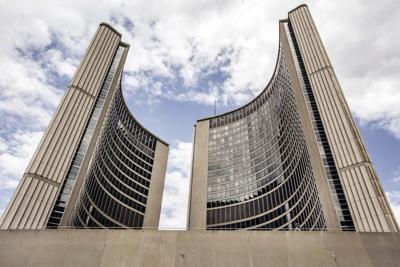Tenants of a ║ŻĮŪ╔ńŪ°╣┘═°rooming house were forced to sleep in their coats, boil water in order to bathe and go to the washroom in plastic bags, after basic services in their building were cut off for six months ŌĆö and the city did nothing to help.
That’s the conclusion of that found the city department responsible for upholding property standards failed to enforce bylaws meant to protect tenants in the case.
The result was that 10 residents had to abandon their homes after enduring conditions one of them described as “torture.”
The report from the office of Ombudsman Kwame Addo examined the aftermath of a minor fire at two-storey multi-tenant┬Āhome in northwest ║ŻĮŪ╔ńŪ°╣┘═°in September 2023. While the building’s 11 tenants were unharmed, in accordance with standard safety procedures utility providers shut off the natural gas and some of the electricity to the building.┬Ā
The providers issued notices to the landlord, directing them to get the building inspected and perform any necessary repairs before restoring the gas and electricity. But the utilities stayed off; all of the residents were left without heat or hot water, and those on one floor had no power.
While the city has a range of bylaws requiring landlords to provide basic living conditions to their tenants, Addo’s office determined that staff in the municipal licensing and standards (MLS) division who were supposed to enforce those rules didn’t visit the property until more than two weeks after tenants made a request.
When bylaw officers did arrive, they didn’t collect evidence, interview witnesses or document an inspection of the property, according to the report.
MLS never determined whether the landlord was in violation of the cityŌĆÖs bylaws that guarantee tenants basic utilities, “and never issued an order for the landlord to restore” the services, the report stated. And while MLS had the authority to restore the services itself, it never considered doing so.
The case was all the more dire because the tenants were among Toronto’s most marginalized, according to Addo. They┬Āwere either working low-income jobs or on social assistance. Most of them were newcomers and all were Black.
The residents told the watchdog’s investigators that as the outages persisted they experienced stress, loss of sleep and social isolation, because they couldn’t properly bathe. Tenants quoted in the report said they felt like they were effectively homeless, and living without heat, hot water or power was “torture.”
Residents without power couldn’t cook or keep food without it spoiling. “One tenant used plastic bags to go to the washroom at night and disposed of the waste the next day in a garbage bin,” according to the report.
Ten of the 11 residents ŌĆö including a woman who was seven months pregnant at the time of the fire, and a┬Āsenior citizen and his daughter, who was deaf and on social assistance ŌĆö left the building. Most moved into accommodations with higher rent or “weaker tenant protections,” according to the report.
One resident continued living in the rooming house for six months, through the winter, with no heat or hot water. For three months, he had no running water at all.
In addition to criticizing the actions of MLS, the ombudsman found that when a tenants union working on behalf of the residents contacted a city program designed to support renters at risk of eviction, staff took more than a month to respond, and declined to help.
The city’s handling of the case “raised serious questions for me about whether it was living up to its duty to treat residents fairly,” wrote the ombudsman, who found MLS acted “arbitrarily” and was “biased” in favour of the landlord. He also concluded the city’s actions were inconsistent with Toronto’s commitment under its Housing Charter to “progressively realize the right to adequate housing.”
In a written response to the report, a senior city staffer said ║ŻĮŪ╔ńŪ°╣┘═°is committed to implementing all of the report’s 27 recommendations, which call for MLS to review how it enforces rental housing standards and to improve the training its bylaw officers receive, among other measures.
Deputy city manager David Jollimore wrote that since September 2023 the city has implemented a new regulatory framework for rooming houses that is designed to protect tenants.
The new regime legalized rooming houses ŌĆö buildings where residents rent separate rooms but share common amenities such as kitchens and washrooms ŌĆö across the city, replacing a patchwork that outlawed them in some neighbourhoods. The framework, which came into effect in the spring of last year, imposed additional safety standards and required owners to apply for a licence to operate a multi-tenant home.
“The city is committed to continually improving our work to ensure rental housing is safe, secure, and habitable,” Jollimore wrote.
The ombudsman’s report doesn’t identify the building or any of the individuals involved in the case. But Chiara Padovani, founder of the York South-Weston Tenant Union, says it was her team that flagged the heat and water shut-off to the ombudsman.
She said the case is ŌĆ£definitely indicative of a bigger issue.ŌĆØ
Padovani described property standards enforcement in ║ŻĮŪ╔ńŪ°╣┘═°as chronically ŌĆ£ineffective,” which puts renters’ health and safety at risk. While landlords are responsible for basic upkeep of properties, she said she believes city hall needs to act as a better safeguard against substandard conditions by strictly enforcing the rules.
ŌĆ£The city is failing to uphold their own bylaws, and thereŌĆÖs really no teeth,ŌĆØ she said.
Mayor Olivia Chow, who has pledged to make renters a focus of her administration, said in a statement the case was “a terrible example of negligence that left tenants in a vulnerable and utterly unacceptable situation.”
“Everyone deserves safe housing and we must do more to protect renters,” she said.




























To join the conversation set a first and last name in your user profile.
Sign in or register for free to join the Conversation